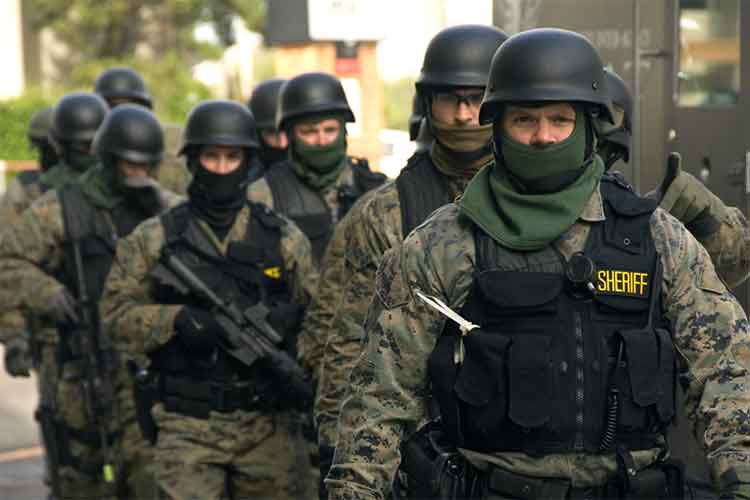Since the 1990s, police in the U.S. have acquired billions of dollars' worth of military equipment—including mine-resistant vehicles, body armor, and semi-automatic weapons. This is perhaps the most striking example of police militarization, wherein police are adopting military culture, tactics, and equipment. Such equipment and tactics are used in many ways, from dealing with natural disasters to conducting drug raids to, as we saw in the summer of 2020, suppressing protests.

While proponents of police militarization argue that it protects police and public safety, research often finds the opposite. For example, economist Federico Masera found that police militarization increases violence by and against the police.
Why, Then, Has Police Militarization Proliferated in Recent Years?
Researchers have typically thought of police militarization as either a reaction to rising crime or as an effort to control Black, Hispanic, and Native American communities. In support of the latter possibility, research has shown that police departments in Black communities acquire more militarized equipment than those in White communities, and that SWAT teams are more readily deployed to Black than to White neighborhoods. Importantly, these studies control for crime rates, finding that the link between racial demographics and police militarization cannot be explained by differences in crime. Building from this perspective, my research team examined recently the link between racial prejudice and police militarization.
We began by surveying 765 White Americans about their racial attitudes and opinions toward police militarization. Consistent with our predictions, people who reported more negative attitudes toward Black and Native Americans tended to express a greater preference for a militarized police force. That is, people who agreed with statements such as "if Black people would only try harder, they could be just as well off as White people" tended to also agree that "Any equipment that the military uses should be allowed to be used by police officers as well."
Does this relationship exist only because political conservatives (relative to liberals) are more likely to support police militarization, as well as more likely to hold negative racial attitudes? Testing this idea, we controlled for participant-level political conservatism, finding that this did not explain the relationship between prejudice and support for police militarization (nor did household income and perceived level of neighborhood crime).
Moving Beyond Attitudes
While this first study tells us that racially prejudiced attitudes correlate with support for police militarization, we were also interested in actual police militarization, not just people's attitudes toward it. Is racial prejudice also associated with police acquisitions of militarized equipment? To answer this question, we examined records from the 1033 Program—a federal program which distributes surplus military equipment to police for little to no cost. For each state, we computed the amount of 1033 Program equipment acquired by all police departments, which totaled over 300,000 pieces of equipment acquired by hundreds of departments. We also obtained data on state-level prejudice from Project Implicit. For each state, we computed the average level of implicit bias (measured using very subtle techniques) and explicit bias (directly self-reported by the person) against Black and Native Americans from over 3 million White Americans. As in Study 1, the results were consistent with our predictions; states relatively higher in prejudice acquired more militarized equipment, even when controlling for political conservatism.
We found similar patterns for anti-Black and anti-Native American prejudice, though some differences are worth noting. As mentioned above, we looked at implicit and explicit bias. For anti-Black bias, implicit and explicit bias were strongly correlated with each other, and both were positively associated with police acquisition of militarized equipment. However, for anti-Native American bias, implicit and explicit bias were not correlated, and only implicit bias was correlated with militarized equipment.
These findings are consistent with previous research showing that person-level prejudice is associated with positive attitudes toward the police and that region-level prejudice is associated with racial disparities in traffic stops and use of lethal force. Our studies also speak to the ongoing militarization of police, suggesting that, rather than concern about crime, its proliferation is motivated by racial prejudice.
For Further Reading
Jimenez, T., Helm, P. J., & Arndt, J. (2022). Racial prejudice predicts police militarization. Psychological Science, 33(12), 2009-2026. DOI: 10.1177/09567976221112936
Mummolo, J. (2021). Re-evaluating police militarization. Nature Human Behaviour, 5(2), 181-182. DOI: 10.1038/s41562-020-01010-7
Steidley, T., & Ramey, D. M. (2019). Police militarization in the United States. Sociology Compass, 13(4), 1-16. DOI: 10.1111/soc4.12674
Tyler Jimenez is an Assistant Professor in the Department of Psychology at the University of Washington. He researches social inequality at the macro and micro levels.




